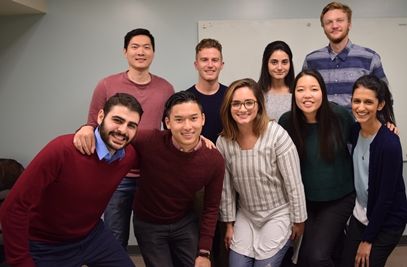
A Queen’s Pro Bono Students Canada (PBSC) program is helping acclimatize recent immigrants in the Kingston area to the Canadian legal system. The Legal Education for Refugees Project sees students go to KEYS Job Centre or Kingston Community Health Centres to give legal education presentations to newly arrived, permanent-resident refugees in a classroom setting.
“These newcomers, often from war-torn countries, have been through an incredible amount of confusion and uncertainty,” says project leader Yamen Fadel, Law18. “When they arrive here, they are expected to follow the law to the same standard as people who were born here.
“The idea came from the supervising lawyers, Leslie Morley, Law’86, and Angela Fallow, Law’06, who noticed that newcomers were being caught by the criminal law system without awareness of their actions being illegal,” he continues. “Our partners at KEYS Job Centre have been at the frontline in the efforts of supporting immigrants. They saw the need for such a program and have been instrumental in supporting it.”
The demand is significant: more than 200 refugees have settled in the Kingston area over the past 12 months, with more on the way. “They benefit from this program by learning about important legal topics such as family, criminal, immigration, landlord/tenant and employment,” Fadel says. “Additionally, familiarity with the laws also provides familiarity with Canadian society, which makes adjusting easier.”
Student volunteers have the opportunity to develop and apply skills such as legal research and public speaking that they have learned in law school to help others. They also get to see first-hand how the law can affect vulnerable individuals.
Fadel himself is an immigrant from Syria. “Because of my background, I value the importance of diversity within the composition of any society,” he says. “Having gone through the transition to Canada, and the difficulties that come with it, I thought that I could offer a perspective that would help the newcomers in their own journeys as they adapt to the system.”
“The most rewarding aspect about the program is that I can use my experiences from immigrating here to benefit someone going through the same thing. I can provide the tips and tricks that I learned in my time here to make those people’s journeys easier. It is also exciting to showcase the incredible support that the City of Kingston and Queen’s University provide to refugees, as well as the resourcefulness and hard work of students working on the project.”
To learn more about the Legal Education for Refugees Project, watch the team’s video.
By Anthony Pugh